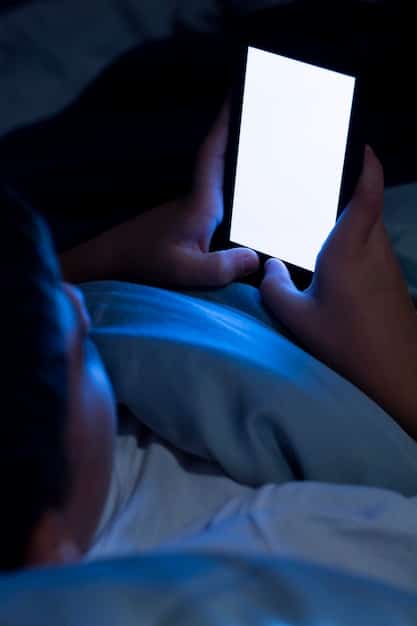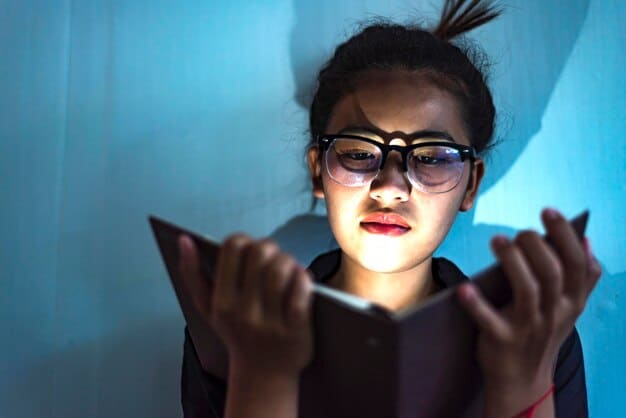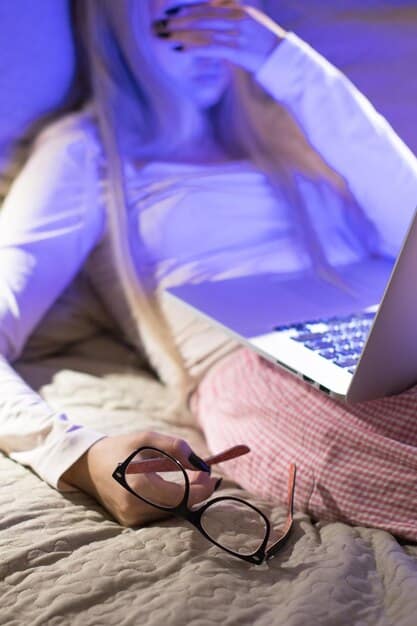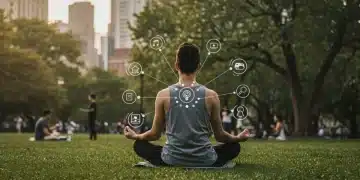Blue Light & Sleep: Minimize Exposure for Better Rest (US)

Is Your Blue Light Exposure Affecting Your Sleep? Absolutely. Research indicates that blue light emitted from screens disrupts melatonin production, impacting sleep quality. Minimizing blue light exposure through screen filters, reducing screen time before bed, and using blue light-blocking glasses can significantly improve sleep patterns.
Are you struggling to get a good night’s sleep? The culprit might be right in front of you – your screens. Let’s dive into how is your blue light exposure affecting your sleep? New research shows how to minimize its impact.
Understanding Blue Light and Its Sources
To understand how to protect your sleep, it’s important to first understand what blue light is. Blue light is a high-energy visible light emitted by the sun and digital devices like smartphones, tablets, and computers. While natural blue light from the sun helps regulate our circadian rhythm during the day, excessive exposure at night can disrupt our sleep.
Blue light affects our bodies by suppressing the secretion of melatonin, a hormone that regulates sleep-wake cycles. When melatonin production drops, it becomes harder to fall asleep and stay asleep, leading to a restless night and potential long-term health issues.
The Science Behind Blue Light and Melatonin
Recent studies delve deeper into the specific mechanisms by which blue light impacts melatonin production. Specialized cells in the retina, called intrinsically photosensitive retinal ganglion cells (ipRGCs), are particularly sensitive to blue light. When these cells detect blue light, they send signals to the brain that inhibit melatonin release.
- ipRGCs and Blue Light Sensitivity: These cells are most responsive to blue light wavelengths, making them key players in the disruption of melatonin production.
- Melatonin Suppression: Studies show that even short-term exposure to blue light can significantly reduce melatonin levels, affecting sleep onset and quality.
- Circadian Rhythm Disruption: Consistent exposure to blue light at night can throw off your body’s natural clock, leading to chronic sleep problems.
Minimizing blue light exposure is crucial for maintaining healthy melatonin levels and ensuring a good night’s sleep. Simple changes to your evening routine can have a significant impact on your overall well-being.
The Impact of Blue Light on Sleep Quality
It’s now clear that blue light affects our natural sleep cycle. Research has demonstrated a direct link between blue light exposure and reduced sleep quality. Disruptions in sleep can lead to a host of negative health outcomes, including fatigue, impaired cognitive function, and even an increased risk of chronic diseases.
The consequences don’t end with a bad night’s sleep. Extended exposure to blue light at night contributes to a cycle of poor rest, impacting not only sleep duration but also the restorative quality of sleep. This effect can accumulate over time, potentially leading to long-term health complications.

Short-Term and Long-Term Effects
The effects of blue light exposure on sleep can manifest both in the short and long term. Understanding these effects is crucial for making informed choices about screen time and sleep hygiene.
- Short-Term Effects: These include difficulty falling asleep, reduced sleep duration, and feeling groggy in the morning.
- Long-Term Effects: Chronic blue light exposure can lead to insomnia, increased risk of depression, and other health problems associated with poor sleep.
- Cognitive Impairment: Studies have shown that disrupted sleep cycles can impair cognitive functions such as memory and concentration.
By understanding the far-reaching implications of blue light exposure, you can take proactive steps to protect your sleep and overall health. Making small changes in your daily habits can produce significant improvements in your well-being.
New Research Findings on Blue Light
Recent studies are continuously revealing more about the harmful effects of blue light exposure and providing insights on how to mitigate these effects. Researchers are exploring new methods to block or filter blue light, as well as investigating how these interventions impact sleep quality and overall health.
One key area of research focuses on the effectiveness of blue light-blocking glasses and screen filters. Studies assess how these tools can minimize melatonin suppression and improve sleep outcomes. The findings often lead to more informed recommendations for consumers looking to manage their blue light exposure.
Key Research Highlights
Stay informed about the latest breakthroughs in blue light research. These findings can provide valuable guidance for optimizing your sleep and reducing the harmful effects of screen exposure.
- Effectiveness of Blue Light Filters: New research indicates that blue light filters can significantly reduce the impact of blue light on melatonin production.
- Impact on Sleep Latency: Studies show that individuals using blue light-blocking glasses tend to fall asleep faster compared to those who don’t.
- Improved Sleep Quality: Research suggests that minimizing blue light exposure contributes to more restorative and higher-quality sleep.
Keeping up-to-date with these findings enables you to make data-driven decisions about your sleep hygiene practices. Armed with this knowledge, you can take more effective measures to improve your sleep and protect your long-term health.
Practical Tips to Minimize Blue Light Exposure
Protecting yourself from blue light doesn’t require drastic measures. Plenty of practical and manageable tips can help reduce your exposure and improve your sleep quality. From simple lifestyle adjustments to the use of specialized tools, there’s a solution for everyone.
Consider the following strategies to incorporate into your daily routine and see noticeable improvements in your sleep. These actionable steps will empower you to take control of your sleep environment and prioritize your overall well-being.

Actionable Steps for Reducing Blue Light
Take charge of your sleep environment and implement these straightforward yet effective strategies.
- Use Blue Light Filters: Install blue light filters on your devices to reduce the amount of blue light emitted.
- Limit Screen Time Before Bed: Avoid using screens at least one to two hours before going to sleep to allow melatonin levels to rise.
- Wear Blue Light-Blocking Glasses: Put on blue light-blocking glasses in the evening to block blue light and promote melatonin production.
By implementing these practical steps, you’ll create a more sleep-friendly environment and greatly improve your ability to fall asleep and stay asleep. Consistent use of these strategies can lead to long-term benefits for your overall health and well-being.
The Role of Technology in Blue Light Mitigation
Technology companies recognize the impact of blue light and are developing innovative tools to mitigate its effects. Operating systems and apps now often include built-in blue light filters, making it easier to manage your exposure.
These technologies offer a convenient way to reduce blue light without needing additional software or hardware. Exploring these features can help you customize your devices for optimal sleep hygiene and reduce the impact of evening screen time.
Technological Solutions to Consider
Stay updated with the latest developments in blue light mitigation technology. These tools can simplify your efforts to protect your sleep and overall health.
- Night Shift Mode: Enable Night Shift or similar features on your devices to automatically reduce blue light in the evening.
- Blue Light Filter Apps: Download apps that allow you to customize the color temperature of your screen to minimize blue light.
- Smart Lighting: Use smart bulbs that allow you to adjust the color temperature, creating a warmer, more relaxing ambiance in the evening.
Taking advantage of these technological solutions can streamline your efforts to manage blue light exposure. Staying informed about these tools helps you create a sleep-friendly environment with minimal effort while enhancing your daily routine.
Creating a Sleep-Conducive Environment
Minimizing blue light exposure is just one piece of the puzzle when it comes to optimizing your sleep. Creating a comprehensive sleep routine and an ideal sleep environment is critical for achieving restful and restorative sleep.
Consider combining blue light reduction strategies with other best practices for sleep hygiene. This multifaceted approach will support your body’s natural sleep-wake cycle and contribute to long-term health and well-being.
Complete Your Sleep Arsenal
Enhance your sleep hygiene routine by incorporating these best practices along with blue light mitigation strategies.
- Maintain a Consistent Sleep Schedule: Go to bed and wake up at the same time every day to regulate your circadian rhythm.
- Optimize Your Bedroom: Keep your bedroom dark, quiet, and cool to create an environment conducive to sleep.
- Avoid Caffeine and Alcohol Before Bed: These substances can disrupt your sleep cycle and make it harder to fall and stay asleep.
By paying attention to your sleep environment and adopting healthy sleep habits, you can unlock the full benefits of minimizing blue light exposure. Prioritizing a holistic approach to sleep will greatly improve your overall quality of life and well-being.
| Key Point | Brief Description |
|---|---|
| 💡 Blue Light Impact | Screens emit blue light, disrupting melatonin and sleep. |
| 👓 Blue Light Filters | Use filters on devices and glasses to block blue light. |
| 🌙 Limit Screen Time | Avoid screens 1-2 hours before bed for better sleep. |
| ⏰ Consistent Routine | Maintain a regular sleep schedule for a healthier sleep cycle. |
Frequently Asked Questions (FAQs)
▼
Blue light is a high-energy visible light emitted by both natural (sun) and artificial sources, like smartphones, tablets, computers, and LED lighting. While the sun is the largest source, prolonged exposure to screens can significantly impact your sleep.
▼
Blue light suppresses the production of melatonin, a hormone that regulates sleep-wake cycles. When melatonin levels are reduced, it becomes harder to fall asleep and maintain restful sleep throughout the night, disrupting your circadian rhythm.
▼
Yes, blue light filters can significantly reduce the impact of blue light on sleep. You can use them by enabling built-in night mode features on your devices, downloading blue light filter apps, or wearing blue light-blocking glasses, especially in the evening.
▼
To improve your sleep, establish a consistent sleep schedule, optimize your bedroom for darkness, quiet, and coolness, and avoid caffeine and alcohol before bed. Creating a relaxing bedtime routine can also greatly help.
▼
Absolutely. Children and teenagers are especially susceptible to the effects of blue light due to their developing eyes. Minimizing their screen time before bed and using blue light filters can significantly improve their sleep and overall health.
Conclusion
In conclusion, understanding and mitigating the impact of blue light is crucial for improving sleep quality and overall health. By implementing practical strategies such as using blue light filters, limiting screen time before bed, and creating a sleep-conducive environment, you can significantly reduce the negative effects of blue light exposure and promote restful, restorative sleep.





